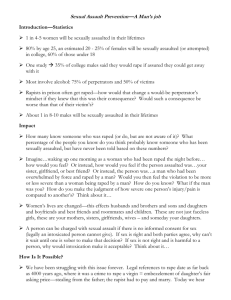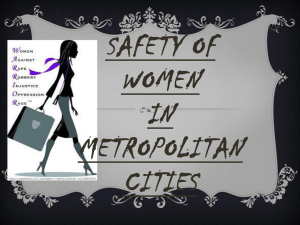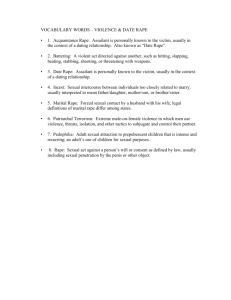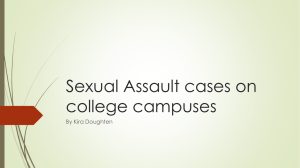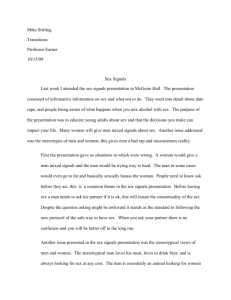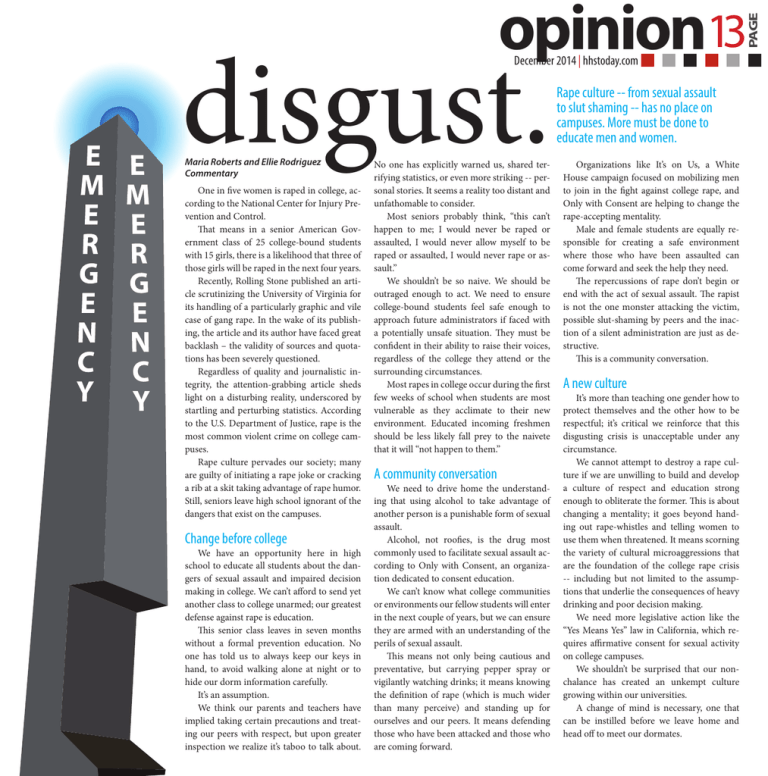
PAGE
opinion13
December 2014 | hhstoday.com
disgust.
Maria Roberts and Ellie Rodriguez
Commentary
One in five women is raped in college, according to the National Center for Injury Prevention and Control.
That means in a senior American Government class of 25 college-bound students
with 15 girls, there is a likelihood that three of
those girls will be raped in the next four years.
Recently, Rolling Stone published an article scrutinizing the University of Virginia for
its handling of a particularly graphic and vile
case of gang rape. In the wake of its publishing, the article and its author have faced great
backlash – the validity of sources and quotations has been severely questioned.
Regardless of quality and journalistic integrity, the attention-grabbing article sheds
light on a disturbing reality, underscored by
startling and perturbing statistics. According
to the U.S. Department of Justice, rape is the
most common violent crime on college campuses.
Rape culture pervades our society; many
are guilty of initiating a rape joke or cracking
a rib at a skit taking advantage of rape humor.
Still, seniors leave high school ignorant of the
dangers that exist on the campuses.
Change before college
We have an opportunity here in high
school to educate all students about the dangers of sexual assault and impaired decision
making in college. We can’t afford to send yet
another class to college unarmed; our greatest
defense against rape is education.
This senior class leaves in seven months
without a formal prevention education. No
one has told us to always keep our keys in
hand, to avoid walking alone at night or to
hide our dorm information carefully.
It’s an assumption.
We think our parents and teachers have
implied taking certain precautions and treating our peers with respect, but upon greater
inspection we realize it’s taboo to talk about.
No one has explicitly warned us, shared terrifying statistics, or even more striking -- personal stories. It seems a reality too distant and
unfathomable to consider.
Most seniors probably think, “this can’t
happen to me; I would never be raped or
assaulted, I would never allow myself to be
raped or assaulted, I would never rape or assault.”
We shouldn’t be so naive. We should be
outraged enough to act. We need to ensure
college-bound students feel safe enough to
approach future administrators if faced with
a potentially unsafe situation. They must be
confident in their ability to raise their voices,
regardless of the college they attend or the
surrounding circumstances.
Most rapes in college occur during the first
few weeks of school when students are most
vulnerable as they acclimate to their new
environment. Educated incoming freshmen
should be less likely fall prey to the naivete
that it will “not happen to them.”
A community conversation
We need to drive home the understanding that using alcohol to take advantage of
another person is a punishable form of sexual
assault.
Alcohol, not roofies, is the drug most
commonly used to facilitate sexual assault according to Only with Consent, an organization dedicated to consent education.
We can’t know what college communities
or environments our fellow students will enter
in the next couple of years, but we can ensure
they are armed with an understanding of the
perils of sexual assault.
This means not only being cautious and
preventative, but carrying pepper spray or
vigilantly watching drinks; it means knowing
the definition of rape (which is much wider
than many perceive) and standing up for
ourselves and our peers. It means defending
those who have been attacked and those who
are coming forward.
Rape culture -- from sexual assault
to slut shaming -- has no place on
campuses. More must be done to
educate men and women.
Organizations like It’s on Us, a White
House campaign focused on mobilizing men
to join in the fight against college rape, and
Only with Consent are helping to change the
rape-accepting mentality.
Male and female students are equally responsible for creating a safe environment
where those who have been assaulted can
come forward and seek the help they need.
The repercussions of rape don’t begin or
end with the act of sexual assault. The rapist
is not the one monster attacking the victim,
possible slut-shaming by peers and the inaction of a silent administration are just as destructive.
This is a community conversation.
A new culture
It’s more than teaching one gender how to
protect themselves and the other how to be
respectful; it’s critical we reinforce that this
disgusting crisis is unacceptable under any
circumstance.
We cannot attempt to destroy a rape culture if we are unwilling to build and develop
a culture of respect and education strong
enough to obliterate the former. This is about
changing a mentality; it goes beyond handing out rape-whistles and telling women to
use them when threatened. It means scorning
the variety of cultural microaggressions that
are the foundation of the college rape crisis
-- including but not limited to the assumptions that underlie the consequences of heavy
drinking and poor decision making.
We need more legislative action like the
“Yes Means Yes” law in California, which requires affirmative consent for sexual activity
on college campuses.
We shouldn’t be surprised that our nonchalance has created an unkempt culture
growing within our universities.
A change of mind is necessary, one that
can be instilled before we leave home and
head off to meet our dormates.

